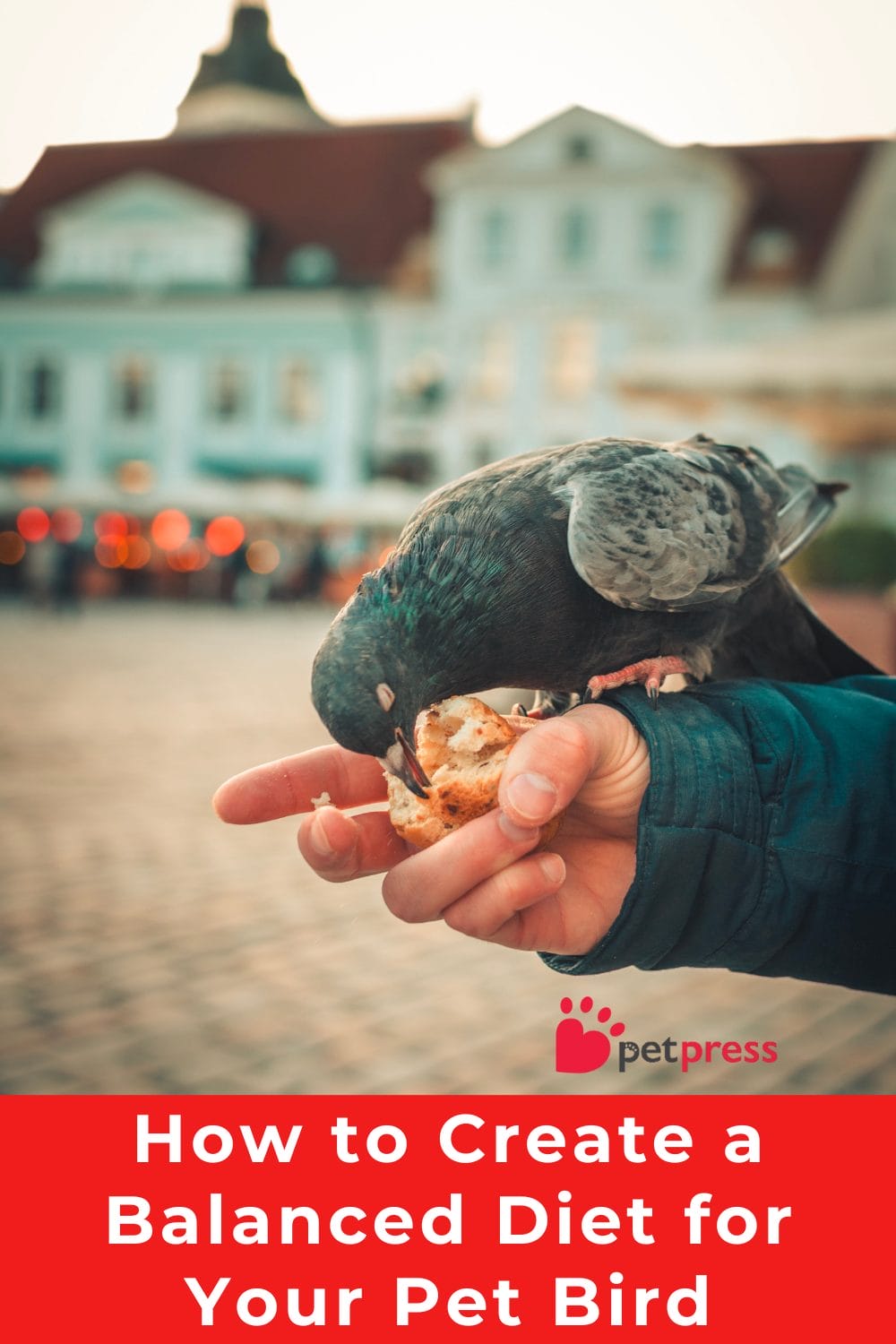
Are you a bird owner aiming to keep your feathered buddy healthy and cheerful? The key is a balanced diet for your pet bird. This diet is crucial for their health and happiness. This easy guide explains how to feed your bird right for a long, joyful life.
Feeding your bird shouldn’t be confusing. We’ll show you what foods are best and how much to give. Get ready to learn how a balanced diet can make your pet bird thrive!
Understanding What Your Pet Bird Needs
To keep your pet bird at its best, it’s important to know what goes into a healthy diet. Let’s look at what nutrients and foods your bird really needs to stay happy and healthy.
A balanced diet is crucial for your pet bird, just like it is for humans. It keeps them healthy and energetic. Without it, birds can develop health issues and feel unhappy.
What does ‘balanced‘ mean?
When we say a diet is “balanced” for birds, it means it includes a variety of foods. This variety helps meet all their nutritional requirements. It’s about giving the right mix of seeds, fruits, veggies, and proteins.
A balanced diet supports your bird’s overall health, affecting everything from feather quality to longevity. It ensures they get all the essential nutrients they need to function optimally. Plus, a healthy bird is a happy bird!
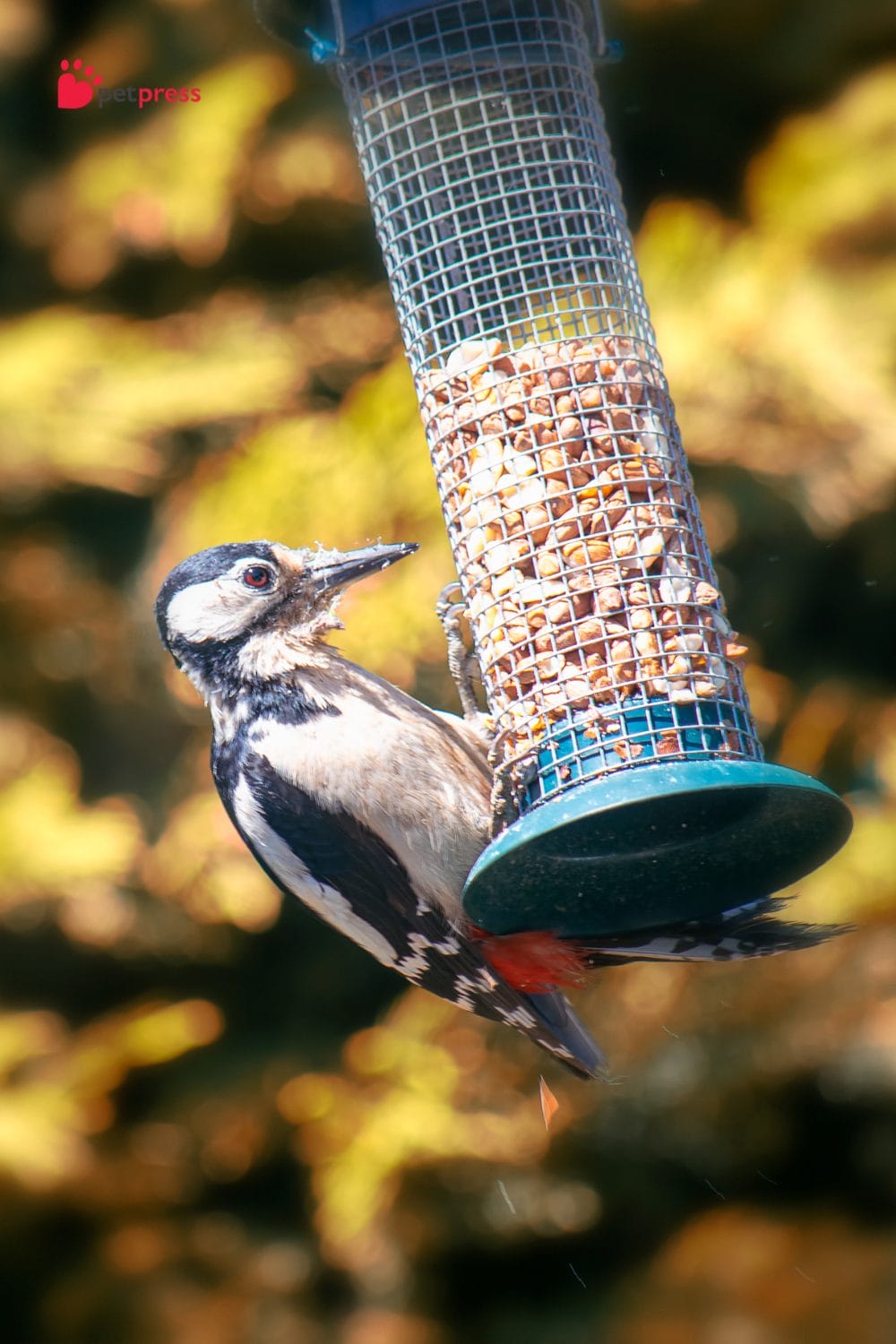
Key Components of a Bird’s Diet
A balanced diet for your pet bird includes several vital components. Each type of food plays a unique role in keeping your bird healthy and active.
Seeds and Grains: Not too much, just right!
Seeds and grains are like the bread and cereal for your pet bird—they’re important, but they shouldn’t make up the whole meal. Though they deliver essential nutrients, feeding your bird too many seeds can lead to weight gain and other health problems. It’s all about balance.
When choosing seeds and grains, variety is key. Mix things up to ensure your bird gets a range of nutrients. For example, you can offer a blend of millet, sunflower seeds, and maybe some quinoa, which are all healthy in moderate amounts. This way, you’re providing a rounded diet that supports better overall health for your feathered friend.
Fruits and Vegetables: Add color and nutrients
Fruits and vegetables are not just snacks; they’re vital parts of a balanced diet for your pet bird, enriching their meals with essential vitamins and minerals. Incorporating a variety of colorful fruits and veggies like carrots, apples, and leafy greens can boost their overall health. Always chop these into small, manageable pieces to ensure your bird can easily eat and digest them.
When introducing new fruits and vegetables, do so gradually to observe how your bird reacts to them. Some birds might prefer certain textures or flavors. Remember, moderation is key—while fruits and vegetables are beneficial, they should be given alongside a well-rounded diet that includes seeds, grains, and appropriate proteins.
Proteins: Build muscles and feathers
Proteins play a vital role in your pet bird’s diet, helping to build strong muscles and maintain healthy feathers. Including the right amount of protein in their diet ensures they stay active and their plumage stays bright and full.
Cooked eggs, which are easily digestible and nutritious, make an excellent protein source. Additionally, specially formulated bird pellets are designed to provide a balanced mix of proteins and other essential nutrients.
For birds, not just any protein source will do. It’s important to choose options that are safe and beneficial for them. Overfeeding protein can be harmful, so it’s crucial to measure the right quantities based on your bird’s specific species and size requirements. Keep the protein sources varied and appropriate to make sure your feathered friend benefits fully from their meals.
Supplements: For added nutrients
Supplements can be a valuable addition to your pet bird’s diet, especially if their regular meals might not meet all their nutritional needs. Vitamins, minerals, or amino acids might be required to keep your bird in tip-top health. However, it’s important not to overdo it as too much can be just as harmful as too little.
Before you start adding any supplements, it’s crucial to talk with a veterinarian. A vet can confirm whether your bird actually needs extra nutrients based on their species, age, and health condition. They can also guide you on the appropriate types and amounts to provide, ensuring your bird gets exactly what it needs without any risks of overdose.
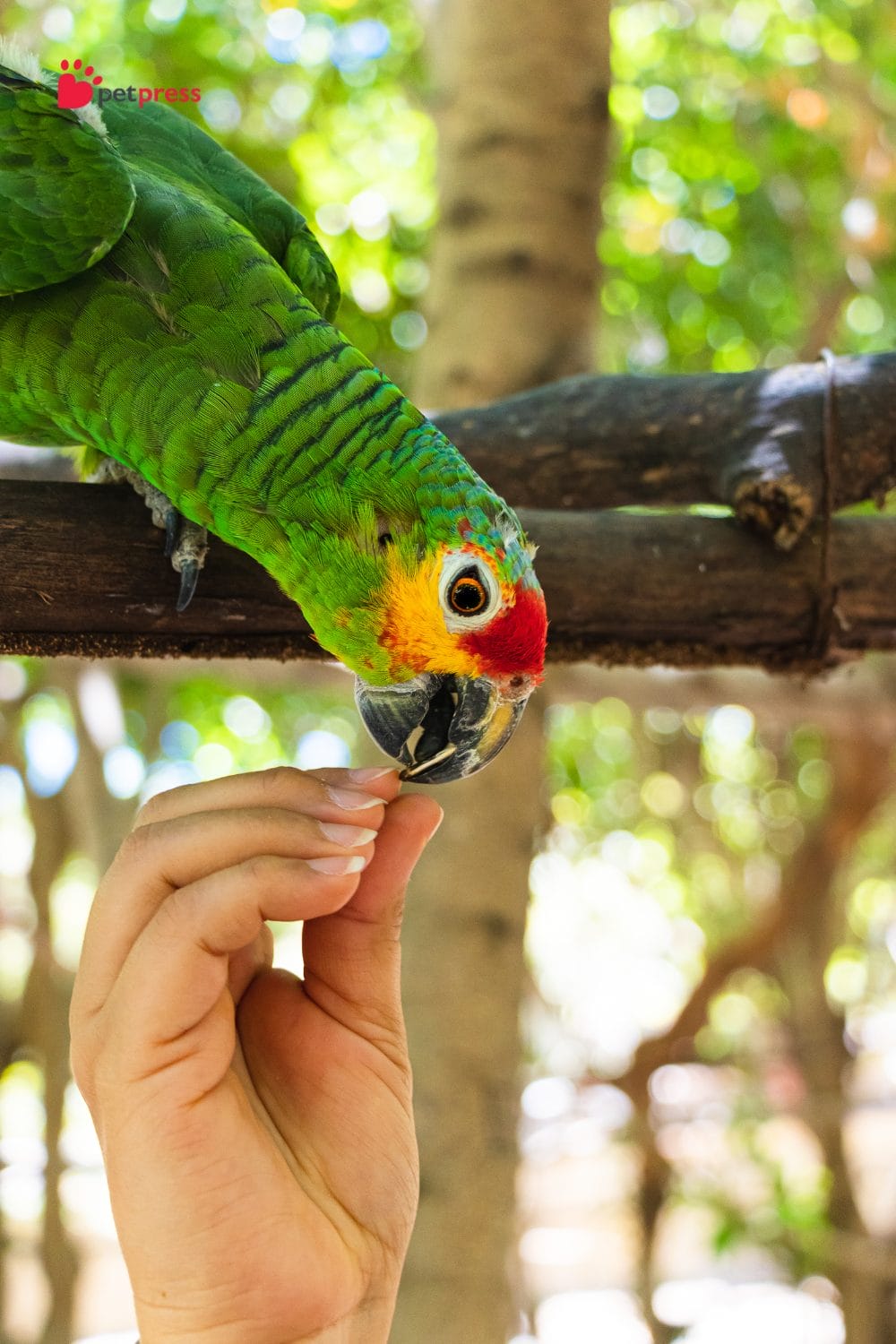
Planning Your Bird’s Meals
Getting your bird’s diet right is crucial for their overall health. A little planning can go a long way in ensuring they get the nutrients they need.
1. Choose safe and healthy fruits and veggies
- Apples (without seeds)
- Bananas: Easy to eat and digest.
- Carrots: Great for their vision.
- Spinach: Packed with vitamins.
- Peas: Fun and nutritious for pecking.
Introduce these foods slowly into your bird’s diet to see what they enjoy and tolerate well.
2. Consider the proper seeds and grains for different bird types
Different birds need different seeds and grains. For example:
- Parakeets: Mostly millet and canary seed.
- Parrots: A mix of sunflower seeds, safflower, and corn.
- Canaries: Prefer fine seeds like canary and flax seeds.
Match the seed mix to your bird’s species for optimal health.
3. Avoid these dangerous foods and these common mistakes
Dangerous foods that can harm your bird:
- Avocado: Extremely toxic to most birds.
- Chocolate: Can cause serious health issues.
- Onions and Garlic: Can lead to digestive upsets.
Steering clear of these can prevent health emergencies.
Common mistakes in feeding pet birds:
- Offering too many treats or fatty seeds.
- Not providing enough variety in the diet.
- Forgetting to provide fresh water daily.
Avoid these mistakes to keep your bird healthy and content. Each meal should contribute to their well-being, mirroring the care you’d want for any loved one.
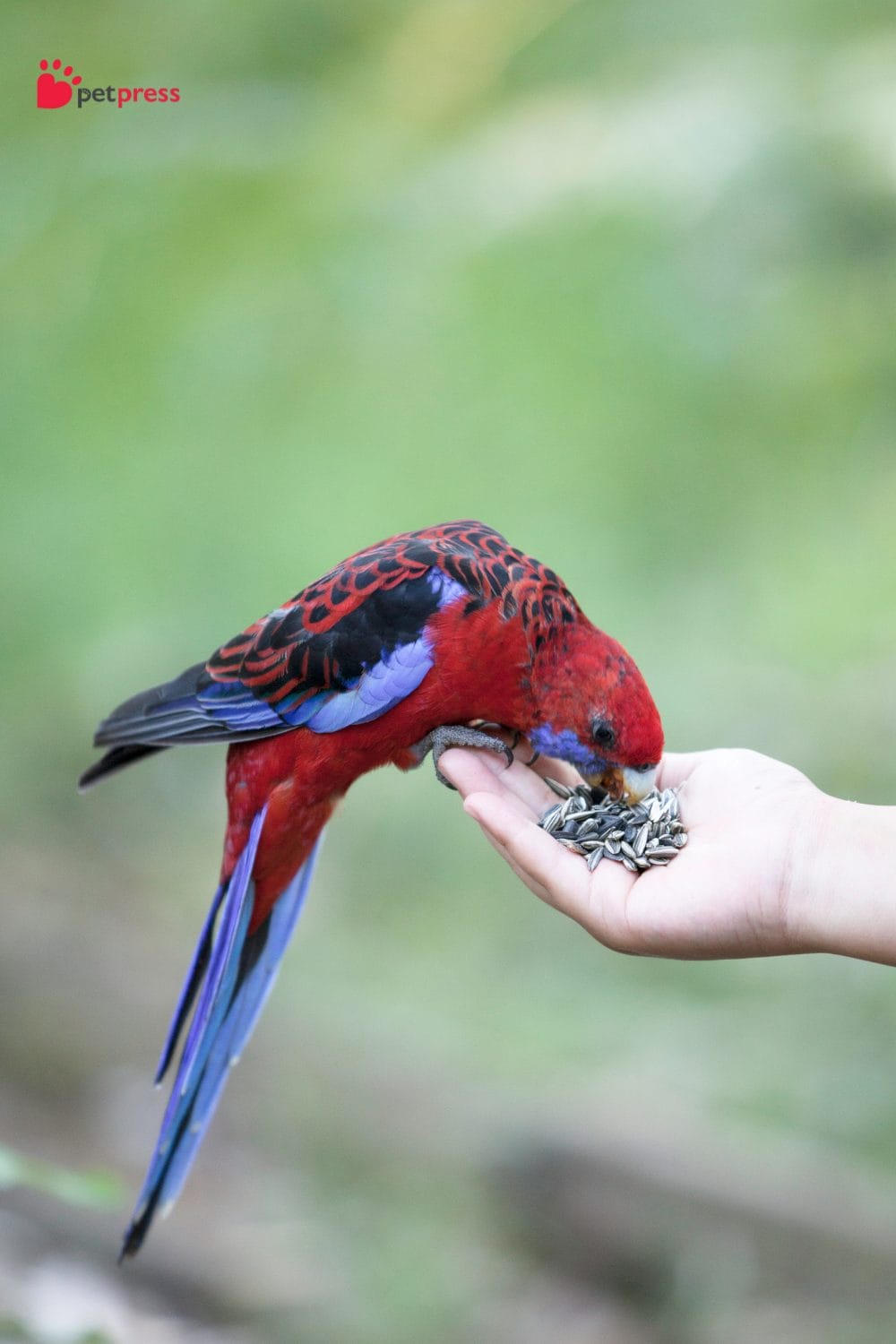
How to Feed Your Bird
Feeding your bird correctly is more than just filling their bowl with seeds. Here’s how to manage portion sizes and make mealtime a fun event.
Portion Sizes and Frequency
How much and how often should your bird eat? Every bird is different. Small birds like budgies might just need a couple of teaspoons of food daily, while larger birds like parrots may require much more. Feed your birds twice a day to keep their energy levels steady.
Adjusting food amounts according to bird size and activity level. A more active bird will need more food than a less active one. Monitor your bird’s weight and activity, and adjust their food portions accordingly to keep them in top shape.
Creative Feeding Tips
Making mealtime fun and engaging. Birds are smart, and they like a challenge. So, try hiding their food in toys or different parts of their cage to encourage foraging, which is good for their mental fitness.
DIY bird food recipes
- Fruit kabobs: Skewer some chopped, bird-safe fruits on a stick and hang it in their cage.
- Veggie mix: Combine finely chopped veggies and sprinkle them over their usual seeds.
- Egg biscuit treats: Crush a hard-boiled egg and mix it with a little water and birdseed, then bake until hard.
By tweaking how you feed your bird and what you feed them, you’ll see a happier, healthier pet. Plus, mealtime will become a fun part of the day that you both look forward to.
Monitoring Your Bird’s Health
Keeping an eye on your bird’s health is crucial to make sure they’re getting the most from their diet. By noticing small changes, you can keep your pet feeling its best.
What to look for in a healthy bird:
- Bright, clear eyes: A healthy bird should have eyes that are vibrant and alert.
- Smooth feathers: Feathers should be smooth and shiny, not rough or plucked.
- Active behavior: Active and playful birds are often well-nourished.
- Regular droppings: Their droppings should be consistent in form and color.
Each of these signs points to a balanced diet working well for your bird. Keeping track of these can help you ensure they’re on the right track.
When should you consult a vet?
Changes in diet and what they mean: Sudden changes in your bird’s eating habits can signal health issues. If they eat less or refuse food, it might be time to worry.
How often to check with a vet: Regular check-ups, at least once a year, are important. More frequent visits might be needed if you notice any unusual signs.
By understanding these key factors, you can maintain your bird’s health at its peak. Watch their behavior and physical condition closely and always consult with a vet if you’re unsure. This proactive approach will help your feathered friend lead a vibrant and full life.
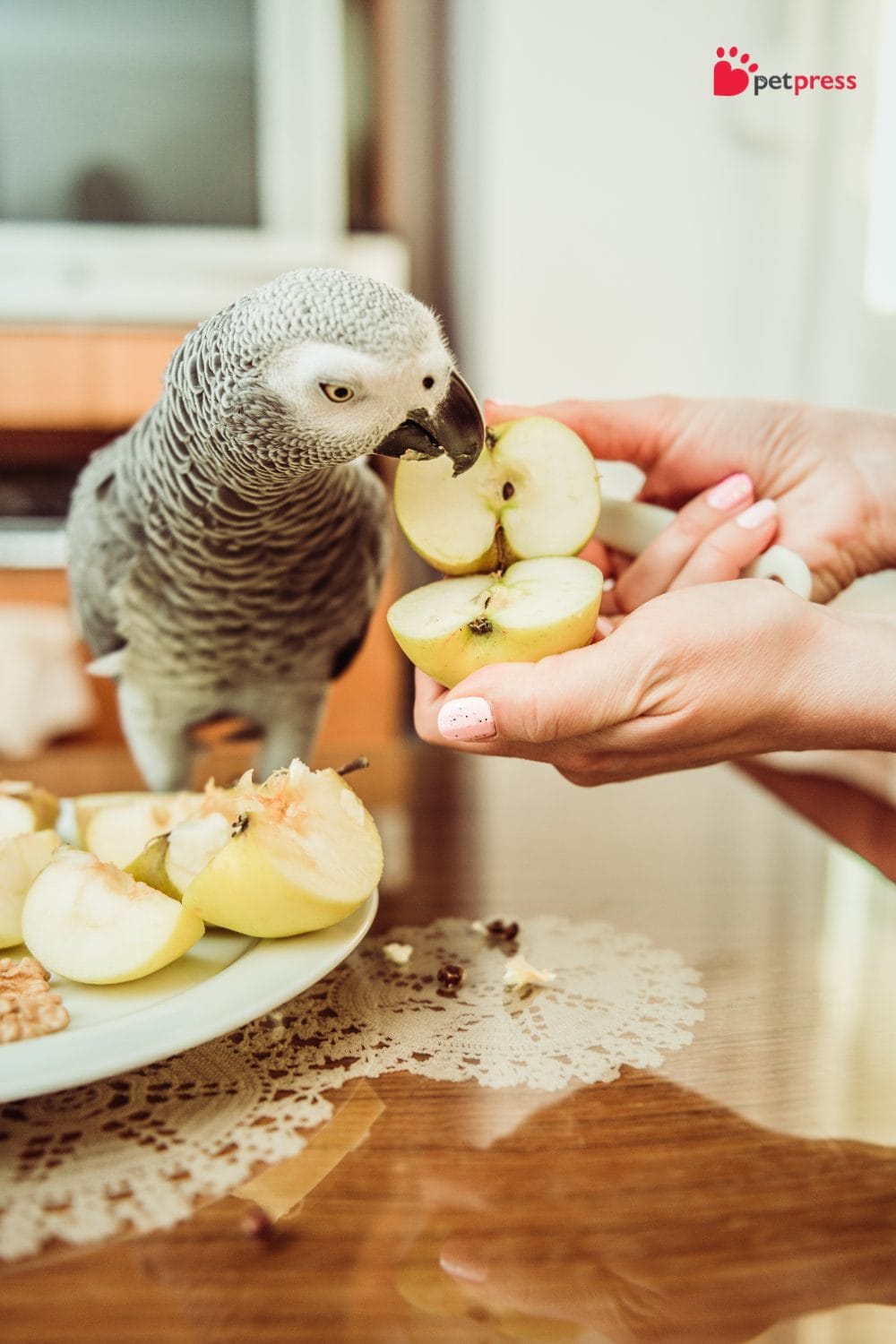
Wrapping It Up: Keeping Your Pet Bird Thriving
Providing a balanced diet for your pet bird is more than just a responsibility; it’s a way to express your love and care. By focusing on their diet, you are setting the stage for a vibrant, energetic, and healthy life for your feathered companion. Remember, a happy bird is a healthy bird!
Keep an eye on the food they eat and their daily habits. Small changes can make a big impact on their overall well-being. If you’re ever in doubt, talking to a vet can put your mind at ease and ensure you’re on the right track.
Thank you for caring deeply about giving your pet bird the best life possible. Here’s to many joyful years with your chirpy friend, full of health and happiness!
FAQs About Feeding Pet Birds
It’s best to avoid feeding birds human snacks, which often contain salts, sugars, and fats that can be harmful to them.
Yes, fresh and clean water must be available to your bird at all times. Change it daily to ensure it’s clean and healthy.
Yes, avoid avocados, chocolate, and fruits with pits like cherries and peaches, as these can be toxic to birds.
A balanced diet for your pet bird should include a mixture of seeds, grains, fresh fruits, vegetables, and an appropriate amount of protein sources like boiled eggs or special bird pellets.
Most birds enjoy broccoli, carrots, and leafy greens like spinach and kale. Ensure all veggies are washed and cut into small, manageable pieces.
- Does Cat Litter Melt Ice? The Complete Guide to Winter Safety - January 30, 2026
- Happy Tail Dogs: Understanding This Common Canine Condition - January 29, 2026
- How Cold Can Outdoor Cats Handle? Feline Winter Safety - January 27, 2026


GIPHY App Key not set. Please check settings